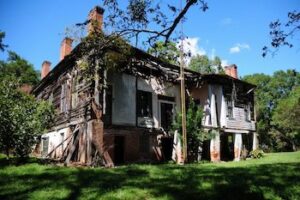
The Prospect Hill Plantation
*The Prospect Hill Plantation is affirmed on this date in 1808. This was a former 5,000-acre plantation in Jefferson County, Mississippi.
In the early 19th century, the plantation was owned by planter Isaac Ross of South Carolina, who enslaved African people to farm cotton as a cash crop. In 1830, Ross and other major planters co-founded the Mississippi chapter of the American Colonization Society, which sought to move enslaved people to Mississippi in Africa, a colony on the coast of what became Liberia. In 1836, Ross died, and his will manumission those enslaved people who agreed to move to Mississippi in Africa and provided for the sale of his plantation to fund their move.
His will was contested and prosecuted by a grandson and heir who occupied the plantation while the court case and appeals were litigated. The will was finally upheld by the Mississippi Supreme Court in 1845. That year, the mansion had burned down, and a girl died in the fire. About a dozen slaves suspected of being responsible were lynched. The plantation was sold, and about 300 enslaved people were freed and transported by 1848 to Mississippi-in-Africa.
They and their descendants were among the Americo-Liberian elite that held power into the late 20th century. In the 1850s, Ross' grandson Isaac Ross Wade reacquired the Prospect Hill property, building a second plantation great house in 1854. Wade and Ross family descendants occupied the house until 1956, and it was occupied by others until 1968. This mansion still stands today. In 2011, the plantation and house were acquired by the Archeological Conservancy for preservation. It could yield artifacts that will contribute to the story of Mississippi slavery, as well as to African culture and the diaspora.
The plantation had a cemetery where Isaac Ross and some of his family were buried. After his grandson Isaac Ross Wade reacquired the plantation, this area became known as the Wade Family Cemetery—the mansion and cemetery property acquired by the Conservancy spanning 23 acres.